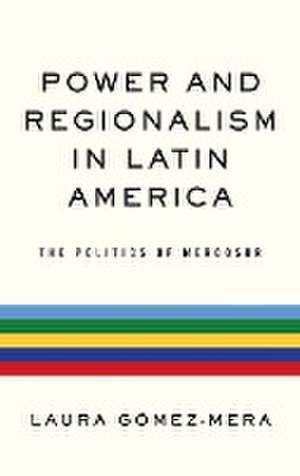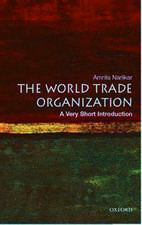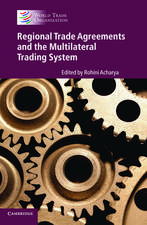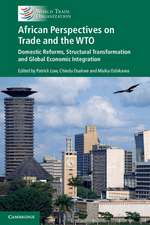Power and Regionalism in Latin America – The Politics of MERCOSUR
Autor Laura Gómez–meraen Limba Engleză Hardback – 29 sep 2022
In Power and Regionalism in Latin America: The Politics of MERCOSUR, Laura Gómez-Mera examines the erratic patterns of regional economic cooperation in the Southern Common Market (MERCOSUR), a political-economic agreement among Argentina, Brazil, Paraguay, Uruguay, and, recently, Venezuela that comprises the world’s fourth-largest regional trade bloc. Despite a promising start in the early 1990s, MERCOSUR has had a tumultuous and conflict-ridden history. Yet it has survived, expanding in membership and institutional scope. What explains its survival, given a seemingly contradictory mix of conflict and cooperation?
Through detailed empirical analyses of several key trade disputes between the bloc's two main partners, Argentina and Brazil, Gómez-Mera proposes an explanation that emphasizes the tension between and interplay of two sets of factors: power asymmetries within and beyond the region, and domestic-level politics. Member states share a common interest in preserving MERCOSUR as a vehicle for increasing the region’s leverage in external negotiations. Gómez-Mera argues that while external vulnerability and overlapping power asymmetries have provided strong and consistent incentives for regional cooperation in the Southern Cone, the impact of these systemic forces on regional outcomes also has been crucially mediated by domestic political dynamics in the bloc’s two main partners, Argentina and Brazil. Contrary to conventional wisdom, however, the unequal distribution of power within the bloc has had a positive effect on the sustainability of cooperation. Despite Brazil’s reluctance to adopt a more active leadership role in the process of integration, its offensive strategic interests in the region have contributed to the durability of institutionalized collaboration. However, as Gómez-Mera demonstrates, the tension between Brazil's global and regional power aspirations has also added significantly to the bloc's ineffectiveness.
"In a very engaging and accessible manner, Laura Gómez-Mera has successfully applied the standing theories of international relations to the case of MERCOSUR. She has woven together international/systemic and domestic theories as these pertain to the role and interaction of Brazil and Argentina, the two main middle powers in MERCOSUR. Through this analysis of regional integration and interstate conflict and cooperation, Gómez-Mera thoroughly covers all the necessary methodological bases while also bringing her subject to life. The sectoral case studies she provides reflect a tremendous amount of original fieldwork; those, combined with a sophisticated conceptual framework, comprise a valuable contribution to the field." —Carol Wise, University of Southern California
| Toate formatele și edițiile | Preț | Express |
|---|---|---|
| Paperback (1) | 252.64 lei 6-8 săpt. | |
| MR – University of Notre Dame Press – 14 apr 2013 | 252.64 lei 6-8 săpt. | |
| Hardback (1) | 696.26 lei 6-8 săpt. | |
| MR – University of Notre Dame Press – 29 sep 2022 | 696.26 lei 6-8 săpt. |
Preț: 696.26 lei
Preț vechi: 953.78 lei
-27% Nou
Puncte Express: 1044
Preț estimativ în valută:
133.25€ • 138.60$ • 110.00£
133.25€ • 138.60$ • 110.00£
Carte tipărită la comandă
Livrare economică 15-29 aprilie
Preluare comenzi: 021 569.72.76
Specificații
ISBN-13: 9780268206697
ISBN-10: 0268206694
Pagini: 304
Dimensiuni: 159 x 236 x 26 mm
Greutate: 0.62 kg
Editura: MR – University of Notre Dame Press
ISBN-10: 0268206694
Pagini: 304
Dimensiuni: 159 x 236 x 26 mm
Greutate: 0.62 kg
Editura: MR – University of Notre Dame Press
Descriere scurtă
Notă biografică
Laura Gómez-Mera is assistant professor in the Department of International Studies at the University of Miami.











